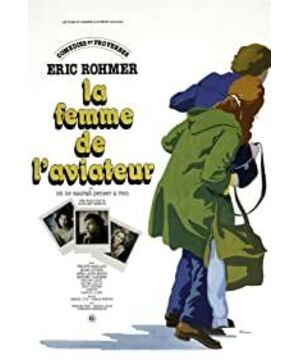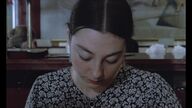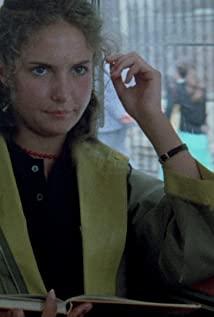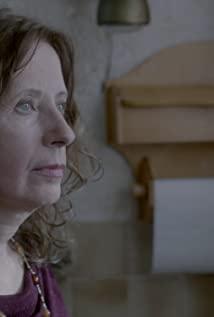"The Pilot's Wife" is the first part of Rohmer's "Comedy and Proverbs" series. Francois loves Anna, but it is difficult for the two to meet because he works the night shift and the day shift. One day Francois went to see Anna and saw her coming out of the house with another man. This man is Anna's old boyfriend - pilot Chris Xing. Not long after, Fu found that Chrissy was with a strange woman again, so he followed the two to monitor their movements. On the way, F got acquainted with the female student Lucy, who expressed sympathy for him and also found out that he was spying on others. After that, Fern and Lucy worked together. They studied the relationship between Christine and the woman, and they also imagined the relationship between Christine and Anna in the past. On one occasion, Fer timidly expressed dissatisfaction with Anna, complaining that she should not associate with Chrissy. Anna explained to him, and explained that the strange woman was not Christine's lover, but his sister. That night, Feudo saw with his own eyes that Lucy, who had been monitoring and talking about Anna with him, was embracing a young man of the same age as her (transferred from the video introduction of Kaixin.com).
"The Pilot's Wife" depicts the image of a lovely man. Love, chance encounter, and expression are always the three basic elements of Rohmer's films. In a nutshell, they are walking + talking. We investigate Rohmer's narrative style. In fact, the original story did not A story cannot build a frame of a story at all. Traditionally, the plot of a film and drama is composed of characters + contradictions. The resolution of the contradictions produces the ending, and the character and fate of the characters determine the nature of the ending.
In Rohmer's films, we can't find any traces of contradictions. The existence of characters is the root of the incident, and the plot relies entirely on the dialogues and mutual conversations of the characters. The worldview in Rohmer's films is derived from the People's contact and communication, and the incompatibility between individuals is more reflected in the independence of individuals. You will find that the characters in Rohmer's films, especially women, have a fundamental self-consciousness. The keen insight and perception of the surrounding things make the characters' conversations just a tool to advance the plot, and the characters themselves will not change at all due to the occurrence of other people's public opinions and events, which just expresses a self-discovery, The profound process of self-identification, every movie is a very small moment in the life of every protagonist; every dialogue will not produce any slight changes to the relationship between the two friends, the fundamental dependence of the characters in Rohmer's films, It is always the transmutation of love and the interweaving of feelings; each story is a journey of love and personal interests intertwined.
The beginning of "Good Marriage" tells us such a proverb "No one can withstand the temptation of building a mansion in Spain." This simple proverb tells us that no one can withstand the temptation of good things, and in contrast, no Practical and blind pursuit of beautiful things is a joke!
"Good Marriage" tells the story of an avant-garde female student who, after having a romantic relationship with a married man, has the idea of marriage. So she planned her marriage and birth plan, and decided to find a suitable person to carry out the task of starting a family. A handsome lawyer is unfortunately favored, but he does not want to be bound by marriage, but she wants to drag him into the cage of marriage. This film is one of Rohmer's "Comedy and Proverbs Series". The meticulous brushwork brings out a good story that will make you smile. The film has Rohmer's usual elegance and lyricism, but this time the addition of milk makes it a bit sweet. The funny thing about the story is that the heroine is not getting married because of love, but because of her somewhat ridiculous and unrealistic marriage plan (transferred from the introduction of Kaixin.com).
The moving part of the film lies in the meticulous discussion and analysis of the contradiction and gap between love and display. In "Good Marriage", Rohmer's consistent analysis tone is particularly academic and even dogmatic. It is said that such a story is not a joke nowadays. It is a reality, many people (especially women) most of the lightning-style marriages are derived from this kind of story, and the subsequent ending is not as full of sadness as we imagined; in fact, this is not the best movie. The interesting plot lies in the grasp of the active and passive relationship between men and women in love. After the heroine falls in love with a lawyer (in fact, it is better to say that she chooses a lawyer as her marriage goal), she still adopts the usual female style. Consistent tactics of restraint and passivity, and the sexy girlfriend around her also repeatedly persuaded her to be restrained, but due to her eagerness to implement her own marriage plan, she finally took the first step of the active offensive. And out of control. The funny thing is that the heroine's eagerness for success makes her offensive not step by step, but increasingly pushes her relationship with the lawyer to ruin, putting herself in an embarrassing situation. In the end, he was politely rejected by the lawyer and made a joke. In fact, this movie seems to be more apt to describe it with a Chinese proverb - a twisted melon is not sweet!
To appreciate Rohmer's works, you must not pay attention to the appreciation and judgment of trinkets and decorations. The carefully selected wallpaper colors and clothing styles, as well as every item purchased and liked by the characters, are the elaboration and judgment of the characters' hearts. It is also the expression of the character's character, which is already everyone's attitude and opinions towards the people around them. For example, the lawyer in Good Marriage only gave a simple drinking cup to the heroine's birthday, and it was two hours late. , but the heroine is going to give a painting she drew when she was four years old to the lawyer (the lawyer forgot to take it away in the end). This comparison is probably humorous enough. If the heroine could understand this at that time, I am afraid There will be no embarrassment behind.
Here's another deep dive into the storytelling techniques of Rohmer's films—not real stories.
Likewise, Rohmer has pointed out more than once that the stories in my films never actually happened, but were imagined by someone.
Human subjective consciousness determines most of human behaviors and principles of doing things, and the judgment of certain things also comes from this. The protagonists in Rohmer's films are even more so. Too much confidence and paranoia make them excessive. It is easy to believe what you see and hear, and most people believe that what they see with their own eyes is the most true. Therefore, most of the stories we see in Rohmer's films are written by the protagonists. The thought and imagined event, and this basic element is also an important part of the so-called "contradiction". For example, in "The Pilot's Wife", under the composition of coincidence, the hero does everything he sees. What things show is not the true face of things, just a certain bridge, a tiny fragment of things, just like us in life, you can never see all the processes of any thing, especially the occurrence. The stories around you are closely related to you, so the stories you see will always have more or less bridges and plots compiled through your personal imagination and understanding. Therefore, in Rohmer’s view , a complete story is composed of a fragment in a person's life, not drawn by a story thread, so that the characters exist, and the story only exists in the human brain, rather than existence and objectivity in the world. For example, in "Bao Lian on the Beach", my sister saw her sister making out with a man she thought was kind, which greatly changed her view of love. In fact, the clip of what the sister saw was only two seconds. Zhong Zhiduo, and if she saw most of the plot of the matter, her opinion on the matter is another matter. Of course, maybe if she could see the whole picture, she would think otherwise. If you can understand Rohmer's view of things in detail, you will get a new experience and more fun when viewing Rohmer's works. And "Pauline on the Beach" can give you a good example of the importance of this.
View more about The Aviator's Wife reviews











